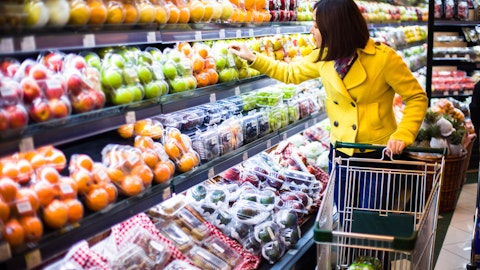The 10 largest supermarket chains in the world operate across several continents and have thousands of locations, both under their corporate names and under other names.
As some predict the inevitable demise of brick-and-mortar stores, supermarkets will likely remain stalwarts of retail that are unlikely to close. Even though online shopping is growing at a fast pace and more and more people opt for home delivery of their groceries, supermarkets will still be around due to their proximity to customers, allowing them to get fresh food whenever they want. Many customers also want to check the quality of the products they’re paying good money for, so they will still buy at least some of their groceries at local supermarkets as opposed to taking their chances with delivery of fruit, veggies, or meat. In this way, the future of supermarkets will be dependent on their performance through both the online and offline mediums.
Since supermarkets are consumer staples companies, they are less sensitive to economic cycles and are expected to do well in any economic environment because people will always need to buy food and other items that they require day-to-day, as opposed to stuff like gadgets and cars. Hence, supermarket companies usually represent good long-term investments.
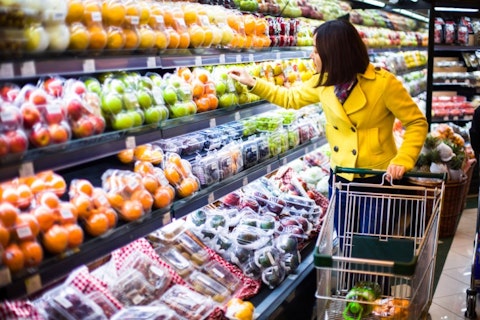
06photo/Shutterstock.com
Alongside housing and transportation, food accounts for one of the largest chunks of the average household’s budget. The US Department of Agriculture estimates that a family of two spends approximately $380 to $760 per month on food alone and that sum goes higher for a family with children. Since households are most likely to spend money at the nearest supermarkets, companies have been aggressively investing in expansion both domestically and internationally. Worldwide food retail sales amount to around $4 trillion annually and the market is dominated by a few large companies that control more than 30% of that figure.
As supermarket chains grow bigger, it means that they have more power over their suppliers and can more easily control their prices. In addition, some supermarket chains, like Wal-Mart Stores Inc (NYSE:WMT) in the U.S and Tesco in the UK, are among their nations’ largest employers, which in turn gives them the power to influence the political and social landscape.
However, as stated earlier, in order to succeed, supermarket chains need to embrace the phenomenon of online shopping and they have to do it fast, as the industry has already started to go through some major changes. Recently, Amazon.com, Inc. (NASDAQ:AMZN) announced the acquisition of Whole Foods Market, Inc. (NASDAQ:WFM) for $14 billion. The move will allow the largest e-commerce retailer to enter the grocery segment, without the need to purchase real estate locations and build its own network, but rather expand on Whole Foods’.
Now then, let’s take a closer look at the 10 largest supermarket chains in the world in terms of the number of locations. As stated earlier, these companies dominate the market and due to their size, they benefit from the cost advantages due to technology and economies of scale, compared to smaller retailers. Check out the list beginning on the next page.
If you’re looking for a different perspective on grocers, be sure to also check out the 11 Largest Grocery Chains By Revenue in America.
10. CBA
Let’s start with CBA, which is a Hungarian-based supermarket chain. The company owns around 5,200 stores and is one of the largest in Central and Eastern Europe. Aside from Hungary, CBA operates in Bulgaria, Lithuania, the Czech Republic, Croatia, Poland, Romania, Serbia, and Slovakia.

Aleksandar Mijatovic/Shutterstock.com
9. BIM
BIM is a Turkish retail company with operations mainly in Turkey, where it has over 5,200 locations. In addition, it has around 280 stores in Morocco and 185 stores in Egypt. BIM is a discount supermarket, offering a relatively small range of food items and other consumer goods at lower prices than its competitors.
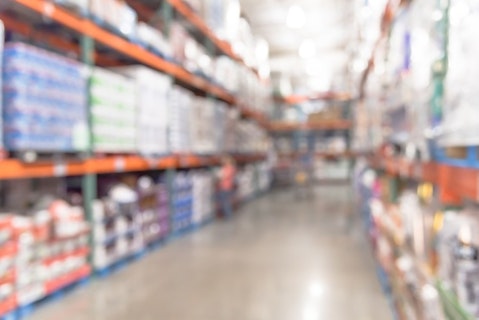
Trong Nguyen/Shutterstock.com
8. Ahold Delhaize
Headquarted in the Netherlands, Ahold Delhaize is a large international food retail group that owns supermarkets and e-commerce businesses under 21 brands. Among the supermarket chains owned by Ahold Delhaize are Food Lion, Hannaford, Martin’s Food Markets, and Mega Image. Overall, the company has 6,500 stores in 11 countries, including the U.S, Belgium, Germany, Greece, and Romania.
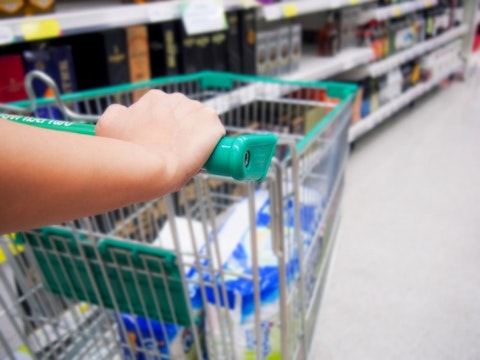
Bohbeh/Shutterstock.com
7. Tesco
Tesco is the largest grocery retailer in the UK, with a share of over 28%. It also operates stores in 12 countries in Asia and Europe, including China, Hungary, Ireland, and Poland. The company has nearly 3,000 stores in the UK and some 3,400 stores across the world. It employs some 460,000 people and is one of the top employers in the UK.
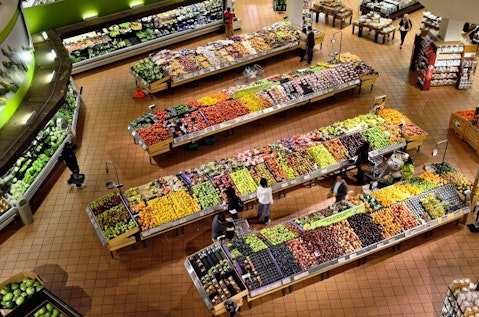
6. Lidl
Lidl operates over 10,000 stores in Europe and has recently expanded to the U.S. Lidl operates discount supermarkets, which offer products at lower prices than competitors and focus either on a smaller range of products, or forgo some other aspects of the shopping experience for the sake of lowering prices, such as store appearance and service. Lidl is owned by the Germany-based Schwarz Gruppe, which also owns hypermarket chain Kaufland with over 1,000 locations in Europe.
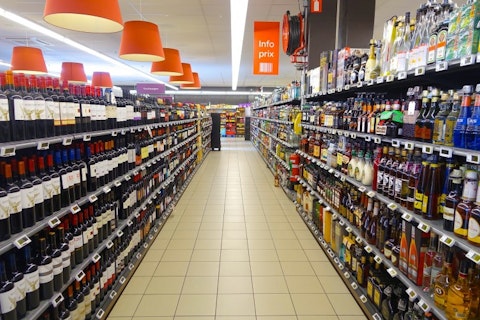
5. Carrefour
French multinational retailer Carrefour owns supermarkets, hypermarkets and convenience stores across the world, with operations in more than 30 countries. The company has nearly 12,000 locations and revenue of $117 billion. It is also one of the largest hypermarket chains in the world, with 1,460 locations.
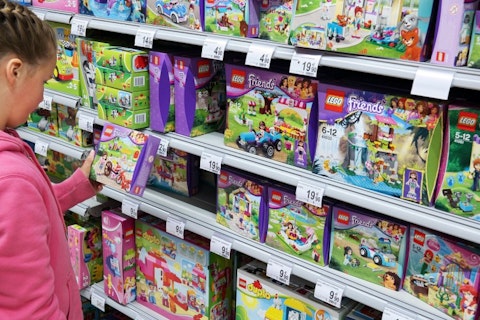
Copyright: defotoberg / 123RF Stock Photo
4. Aldi
Aldi is another large German discount supermarket chain that has over 10,000 stores in 18 countries. The brand Aldi actually belongs to two separate chains, Aldi Nord and Aldi Sud. Aldi Nord and Aldi Sud are financially separated, with Aldi Nord operating in Western, Northern, and Eastern Germany, as well as Denmark, France, the Benelux countries, the Iberian Peninsula, and Poland. Aldi Sud owns stores in western and southern Germany, as well as Ireland, Great Britain, Hungary, Switzerland, and Australia. Aldi Sud also operates in Austria and Slovenia under the Hofer name. In the U.S, Aldi Nord owns the Trader Joe’s chain and Aldi Sud has retail locations under the Aldi name.

Nejron Photo/Shutterstock.com
3. Wal-Mart
Wal-Mart Stores Inc (NYSE:WMT) is the largest company in the world in terms of revenue, having registered sales of $480 billion last year. It also employs 2.3 million people, which makes it the largest private employer in the world. Wal-Mart Stores Inc (NYSE:WMT) operates hypermarkets, discount department stores, and grocery stores. In the U.S it operates under the Walmart brand and also owns the Sam’s Club retail warehouse chain. Overall, it has operations under more than 60 brands in 28 countries and a total of 11,700 locations.

Niloo / Shutterstock.com
Follow Walmart Inc. (NYSE:WMT)
Follow Walmart Inc. (NYSE:WMT)
Receive real-time insider trading and news alerts
Follow the latest Walmart investing news by subscribing to email alerts above.
2. SPAR
SPAR has around 12,500 locations in 42 countries. The Dutch multinational operates stores of different types, divided under sub-brands. It has hypermarkets under the Interspar name, mid-sized supermarkets under Eurospar/Superspar, and small stores called Spar Express, which are designed for filling stations and small locations.

begalphoto/Shutterstock.com
1. 7-Eleven
Finally, there’s 7-Eleven, which is the largest supermarket chain in the world with 60,000 locations in 18 countries. Aside from operating stores, 7-Eleven also offers franchises and licenses. 7-Eleven is headquarted in Irving, Texas, but is owned by Japanese company Seven & I Holdings Co. Japan also accounts for the largest share of its sales, as 18,800 stores are located there.
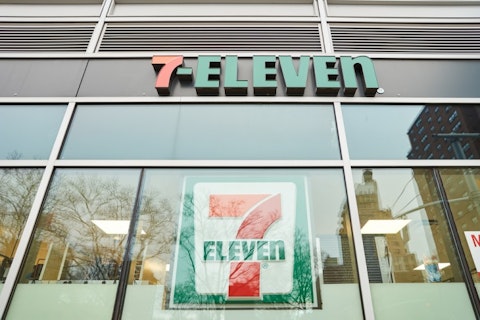
Sorbis/Shutterstock.com
These are the 10 largest supermarket chains in the world, based on the number of locations.
Disclosure: None
